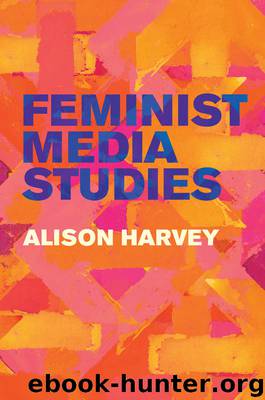Feminist Media Studies by Alison Harvey

Author:Alison Harvey
Language: eng
Format: epub
Publisher: Wiley
Published: 2019-11-07T16:00:00+00:00
Future directions for decolonizing feminist media studies
In this chapter we have seen several ways in which colonial legacies shape the objects, subjects, and approaches of feminist media studies, demonstrating how women’s bodies and subjectivities become a site of negotiation of global difference (Shome 2006). In this final section we consider work that, by introducing a decolonizing approach, challenges these inequitable systems of power and how they inform the field. Such a project aims to undo the impacts of colonialism on ways of knowing, assessing, seeing, and theorizing the media from a feminist perspective. Decolonization refers to the reclamation of spaces and institutions that have been colonized or created by colonizing forces. As we have seen throughout this chapter, decolonizing research, teaching, the classroom, and our own minds is an equally important part of this project, as we are all impacted by global histories of domination and their effects today, and need to actively engage in action supporting liberation, self-determination, and reclamation. Feminist theory, including in its application to the study of the media, popular culture, and communication processes and technologies, has a role to play in challenging epistemic violence, putting an end to the silencing and erasure of the work being done by those who have been marginalized, and reclaiming Indigenous ways of knowing (Tuhiwai Smith 2012).
One important technique within the project of decolonization is the consideration of our citational politics. This entails examining which thinkers tend to feature in our reading lists, syllabi, and bibliographies, and what we have normalized within our disciplines and fields as legitimate approaches to critique. Student-led campaigns seeking to decolonize university curricula demonstrate a growing recognition of how the canons of many disciplines and fields are ‘male, stale, and pale’ (Woolcock 2017), delegating the authority to speak about the world to a narrow group of individuals privileged under White supremacist colonial patriarchy. As feminist media scholars, who we cite is a deeply political question, and an important step in decolonizing our work is to research broadly, read more widely, and cite voices and perspectives marginalized in knowledge production. That marginalization has often included overlooking or erasing the existence of feminist thought within other fields (Ahmed 2013), but in pursuing feminist media studies we might think of how we can be more inclusive and supportive of Indigenous and native liberation from colonial thinking in our research, and indeed draw on the scholarship of Indigenous thinkers themselves. This does not mean simply adding more racialized thinkers to our bibliographies and carrying on as usual; decolonizing feminist media studies entails rethinking the normative frames we bring to the field, including the colonial legacies of racial power (Chakravartty et al. 2018). Mott and Cockayne urge ‘a conscientious engagement with the politics of citation that is mindful of how citational practices can be tools for either the reification of, or resistance to, unethical hierarchies of knowledge’ (2017: 956), demonstrating the centrality of citation politics in feminist media studies’ attunement to power and ethics.
Another tactic for decolonizing feminist media studies
Download
This site does not store any files on its server. We only index and link to content provided by other sites. Please contact the content providers to delete copyright contents if any and email us, we'll remove relevant links or contents immediately.
The Rules Do Not Apply by Ariel Levy(4969)
On the Front Line with the Women Who Fight Back by Stacey Dooley(4873)
The Lonely City by Olivia Laing(4802)
Bluets by Maggie Nelson(4556)
The Confidence Code by Katty Kay(4260)
Three Women by Lisa Taddeo(3434)
Not a Diet Book by James Smith(3429)
Inferior by Angela Saini(3316)
Confessions of a Video Vixen by Karrine Steffans(3309)
A Woman Makes a Plan by Maye Musk(3254)
Pledged by Alexandra Robbins(3179)
Wild Words from Wild Women by Stephens Autumn(3153)
Nice Girls Don't Get the Corner Office by Lois P. Frankel(3044)
Brave by Rose McGowan(2824)
Women & Power by Mary Beard(2767)
Why I Am Not a Feminist by Jessa Crispin(2760)
The Girl in the Spider's Web: A Lisbeth Salander novel, continuing Stieg Larsson's Millennium Series by Lagercrantz David(2723)
The Clitoral Truth: The Secret World at Your Fingertips by Rebecca Chalker(2720)
I Who Have Never Known Men by Jacqueline Harpman(2670)
